Beauty salons’ regulations tightened following misconduct, false advertisements reports
Society – Economy - Ngày đăng : 18:24, 01/11/2024
 |
| Inspectors check a beauty salon in Ninh Xá Ward, Bắc Ninh City, the northern province of Bắc Ninh. — VNA/VNS Photo Thái Hùng |
HÀ NỘI — The Department of Medical Services Administration (DMSA) has asked local departments of health to local into the activities of plastic surgery facilities and beauty salons.
The DMSA, under the Ministry of Health, had recently received feedback from organisations and press agencies related to law violations at medical facilities specialising in surgery, plastic surgery, aesthetics, in particular beauty salons, said Director of the DMSA Hà Anh Đức.
These facilities perform technical services in medical examination and treatment and advertise beyond their permitted scope, causing misunderstandings among the people, leading to many accidents and complications.
In particular, some beauty salons intentionally use the same name as a licenced medical examination and treatment facility, but they operate in a different business location.
Some people were reported to impersonating doctors and hospitals to scam people. Impersonators often create fanpages on social media using the names of real doctors to advertise, misleading customers.
Localities will strengthen inspection and examination of those facilities, strictly handle violations of facilities operating exceeding the scope approved by competent authorities.
Salons which violate the rules will be announced on mass media, so that the people become aware of the issues.
Provincial and municipal departments of health advises local people's committees to coordinate with competent units and police to strengthen inspection and punishment of beauty establishments that perform medical examination and treatment activities and services but are not permitted.
Localities should strengthen education, and guide the implementation of legal regulations on medical examination and treatment establishments, improve people's knowledge that when they need to use surgical, plastic and cosmetic services, they should go to licensed ones.
Local departments of health will publish a list of specialised medical examination and treatment establishments in surgery, plastic and cosmetic surgery that have been granted operating licences on their official websites.
In addition, they will coordinate with departments of information and communications and concerned agencies to monitor and manage advertising content of medical examination and treatment facilities. — VNS
